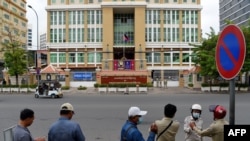A Cambodian newspaper publisher who made critical comments about Prime Minister Hun Sen on Facebook has been sentenced to 18 months in prison.
A Phnom Penh Municipal Court on Wednesday jailed Ros Sokhet for incitement and ordered him to pay a fine of $500 (2 million riels), said Sam Sokong, a lawyer for the journalist. Sokhet runs the Khmer-language news website Cheat Khmer.
The publisher said he believes the conviction affects his freedom of expression, because the posts were his personal opinion, and has asked to appeal, the lawyer said.
Article 41 of Cambodia's constitution guarantees freedom of expression.
Sokhet is the second journalist in recent weeks to be convicted of incitement. The vaguely defined charge is often used to target detractors and critics of Hun Sen and the Cambodian government, rights groups say. In October, Sovann Rithy, who founded the social media news outlet TVFB, was convicted of incitement and given a suspended sentence, and last week Sok Oudom, who runs Rithysen Radio News Station in Kampong Chhnang province, went on trial.
Rights groups have criticized the Cambodian government for using accusations of incitement to curtail press freedom.
Ith Sothoeuth, media director at the Cambodian Center for Independent Media, said the recent legal actions send a threatening message to journalists working on controversial stories.
"I think the sustained conviction of journalists can be a threatening signal to other journalists who are doing their work," Sothoeuth said.
In Sokhet's case, the conviction relates to Facebook posts in June that accused Hun Sen of failing to help people who are in debt, and for urging the prime minister not to nominate his son as his successor, according to the media watchdogs Committee to Protect Journalists and Reporters Without Borders.
TVFB journalist Rithy faced similar accusations when he was arrested in early April. Rithy's charge related to his reporting on comments made by Hun Sen at a press conference in which the prime minister said that informal workers, including motorcycle taxi drivers, should sell their vehicles to buy rice because the government could not help them during the COVID-19 economic downturn.
In a statement earlier this month Human Rights Watch described Rithy's conviction as "an especially outrageous case which exemplifies Cambodia's relentless attack on media freedoms."
Radio station owner Oudom is accused of inciting villagers against the military. The journalist broadcast a Facebook Live report on a long-standing land dispute in Kampong Chhnang province's Phnom Aural Wildlife Sanctuary, according to his wife, Nuth Sovanthou. Authorities accused him of "exaggerated news reporting."
Oudom often posted stories on the Rithysen Radio News Station Facebook page about land disputes, clashes between people and police, and provincial court cases.
"It is unfair for my husband," Sovanthou said, adding that under Cambodia's press law, journalists who publish an error should run a correction, not be arrested.
Un Chanthol, the lawyer representing Oudom, denied that the journalist incited villagers. "He went to report news, not to incite," Chanthol said.
More than 50 local and international rights groups called on Cambodia earlier this month to end its attacks on free expression and to protect journalists who are critical of the government.
The statement listed at least 13 journalists whom it said had faced court complaints for news coverage and said authorities had revoked four media licenses during the coronavirus pandemic for the alleged sharing of false news.
"In the past years, the Cambodian government adopted a series of repressive laws that have enabled a crackdown on independent media and social media and resorted to provisions in the penal code – in particular articles 494 and 495 – to silence critical reporting and its reporters," read the statement, referring to the criminal code provisions on incitement.
In response, Cambodia's Information Ministry said the rights groups' statement is baseless and intended to deceive public opinion. It added that the journalists were arrested for wrongdoing.
Reporters Without Borders ranks Cambodia 144th out of 180 countries, where 1 is the most free, in the 2020 World Press Freedom Index.




